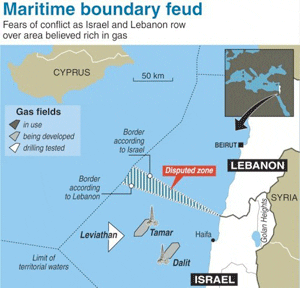BEIRUT — Lebanon warned the United Nations on Monday that Israel’s proposed sea border threatens peace and security, as tensions rise between the neighbors over offshore oil and gas reserves.
“Foreign Minister Adnan Mansur has sent a letter to UN Secretary General Ban Ki-moon rejecting geographic coordinates Israel submitted to the United Nations concerning the northern part of the waters it claims,” said the ministry.

|
| Graphic map outlining the disputed sea border zone between Israel and Lebanon. Lebanon warned the United Nations on Monday that Israel’s proposed sea border threatens peace and security, as tensions rise between the neighbors over offshore oil and gas reserves. |
It said in a statement that the Israeli claim “infringes on Lebanon’s Exclusive Economic Zone,” a sea zone that gives a state the right to explore its maritime resources.
“This is a clear violation of Lebanon’s rights… over an area of some 860 square kilometres, and puts international peace and security at risk,” it said, adding, “We urge the secretary general to take all necessary measures to avoid conflict.”
Lebanon and Israel, which remain technically at war, locked horns over the maritime border after the discovery of potential offshore energy reserves.
The Israeli cabinet in July approved a map and submitted it to the United Nations, which has been asked to mediate the growing conflict.
The Israeli map conflicts with Lebanon’s proposed borders, which give the Jewish state less territorial waters and was submitted to the United Nations last year.
Beirut argues its map is in line with an armistice accord drawn up in 1949, an agreement which is not contested by Israel.
Israel has for months been moving to develop several large offshore natural gas fields in the eastern Mediterranean, some of which are shared with Cyprus.
Lebanon’s Hizbullah-dominated government has meanwhile warned Beirut will not give up its maritime rights and accuses Israel of violating Lebanese waters, territory and airspace.
Israel’s war in 2006 destroyed much of Lebanon’s major infrastructure and killed more than 1,200 Lebanese, mainly civilians, and 160 Israelis, mainly soldiers.






Leave a Reply